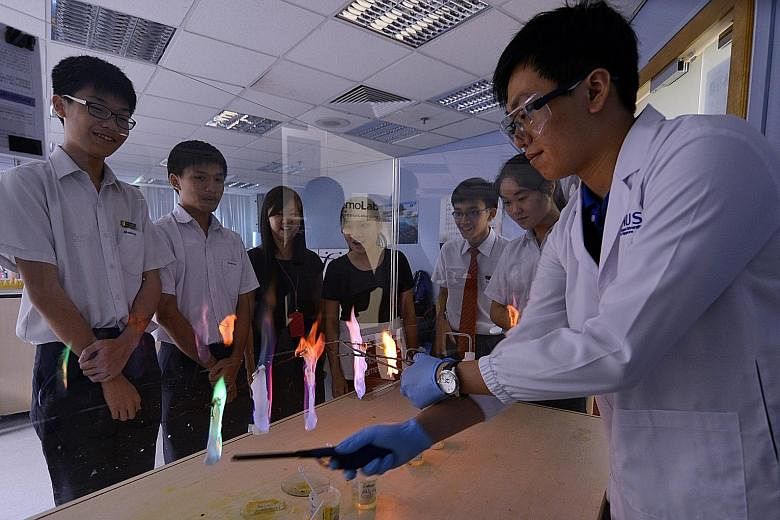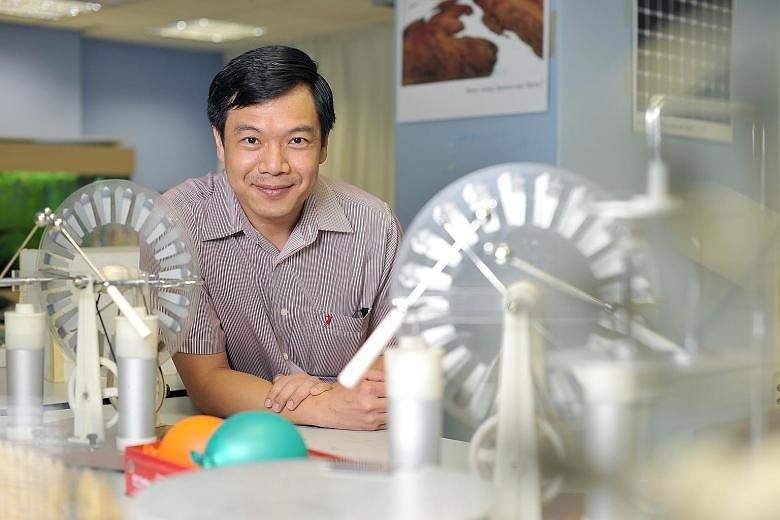Physics is sometimes seen as a complex and hard subject, but Professor Sow Chorng Haur at the National University of Singapore (NUS) hopes to change that mindset.
The head of department of its physics department at the Faculty of Science took on the task of starting a laboratory 15 years ago to enthuse students of all ages with experiments, toys and instruments.
Over the years, he and others have developed hundreds of experiments, such as learning about buoyancy by watching a packet of chilli sauce sink in a bottle of water and observing the various coloured flames when different metals burn.
Such hands-on activities are customised for different groups of students, from primary school pupils to those in junior college.
Prof Sow, who is the founding director of the Science Demonstration Laboratory, said: "Physics concepts can be understood in a simple and very exciting manner.
"Science learning is like this: At first, you think you understand everything but, actually, when you are shown an unexpected counter-intuitive phenomenon, your brain suddenly opens up, and you ask questions naturally."
The approach is to ask students questions, and build on their guesses and interpretations, he added.
"In that sense, they don't take any solutions from us, they develop the answers themselves. They develop an explanation for what they see."
The laboratory, which is part of NUS' science faculty and was known originally as the Physics Demo Lab, was renamed the Science Demo Lab in 2008 to include activities involving biology and chemistry.
That year, it did 40 workshops and reached out to 1,500 students.
This grew to 65 workshops and an outreach to 3,000 students in 2011. Last year, it conducted 75 workshops for 3,500 students.
Since 2011, NUS science undergraduates have also played a bigger role in the facility, as part of the Young Educators in Science initiative started by the science faculty.
The programme is aimed at helping aspiring science teachers learn alongside faculty members to hone their science communication skills. The team conducts workshops in the laboratory and organises public events at places such as the Science Centre Singapore and shopping malls.
Spreading the passion for science
To date, about 250 NUS students have been part of the programme. Of this, 150 are currently undergraduates. "We realised it has become a good platform to train our students... Some of our students become teachers when they graduate," said Prof Sow.
The Science Demo Lab has also caught the eye of chemical giant Dow Chemical Pacific (Singapore), which has given it about $200,000 over the past three years to support its work.
Together with scientists and engineers from Dow, NUS staff and students have designed activities, such as learning how diapers absorb urine and experiencing how an individual's senses of taste and smell influence perception of flavours.
Ms Chian Yuan Lin, 26, a chemistry teacher at Henderson Secondary School, who led a group of 27 students to the Science Demo Lab last month, said they enjoyed the session as the experiments were more "visually interesting" than the ones they were exposed to in school.
Secondary 3 student Zhun Yakun, 16, said the visit was an eye-opener as she learnt concepts not found in the textbooks.
"I did not know how colourful fire could be," she said.
"It made me more interested in learning chemistry and science."
Her schoolmate, Allen Michael Bautista Tan, 15, also in Secondary 3, said it was interesting to observe cells by making microscope lenses and attaching them to their smartphones. "In school, we usually use the real microscope."
The Science Demo Lab is now manned by two full-time scientific officers - Mr Lim Kim Yong, 38, who is doing a PhD in physics, and Mr Kuang Jian Hong, 30, who has a master's in science communication from NUS.
The team, led by Prof Sow, is now working on a book, to consolidate the science demonstrations the facility has developed over the years. It hopes to include materials such as videos and simple science kits as well.



